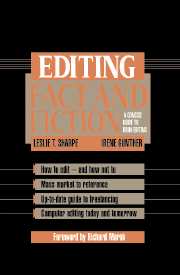Book contents
- Frontmatter
- Contents
- Foreword
- Acknowledgments
- Introduction
- Chapter 1 Who (and What) Is an Editor?
- Chapter 2 Fact or Fiction? Finding Your Niche
- Chapter 3 Principles to Edit By
- Chapter 4 The Editor's Senses
- Chapter 5 The Editor's Sensibility
- Chapter 6 A Guide to Editorial Freelancing
- Chapter 7 Electronic Editing Today and Tomorrow
- Chapter 8 Tools of the Trade and How to Use Them
- Index
Chapter 2 - Fact or Fiction? Finding Your Niche
Published online by Cambridge University Press: 21 September 2009
- Frontmatter
- Contents
- Foreword
- Acknowledgments
- Introduction
- Chapter 1 Who (and What) Is an Editor?
- Chapter 2 Fact or Fiction? Finding Your Niche
- Chapter 3 Principles to Edit By
- Chapter 4 The Editor's Senses
- Chapter 5 The Editor's Sensibility
- Chapter 6 A Guide to Editorial Freelancing
- Chapter 7 Electronic Editing Today and Tomorrow
- Chapter 8 Tools of the Trade and How to Use Them
- Index
Summary
Let us suppose you're a recent college graduate whose heart is set on a career in editing. Or, you've worked for a couple of years in the publicity department of a publishing house and are interested in switching to the editorial side. Or else you're a production editor who's just completed a copyediting course and would like a job that involves more editing. Over the course of several weeks, you've scanned the “Help Wanted” section of your newspaper and found three ads that intrigued you (see ads on next page).
You'll note that all three jobs advertised involve a great deal of routine office work. Ad A, a position with a prestigious university press, specifies “administrative support service, organizational abilities,” “accurate typing skills,” and “computer/word processing experience.” Ad B wants an “energetic, detail-oriented candidate” who will assist two editors at a children's book house with “phones, correspondence, filing.” Ad C, which describes a job with a mass-market publisher, requires “general office duties” as well as some copyediting expertise and computer skills.
You may also note that Ad A differs from the other two in an important respect: It does not mention any editing-related work, such as reading manuscripts or proofreading. This doesn't mean that the Ad A job won't eventually give you a chance to edit. It does mean that you should check this out if you are interviewed for the job.
- Type
- Chapter
- Information
- Editing Fact and FictionA Concise Guide to Book Editing, pp. 31 - 76Publisher: Cambridge University PressPrint publication year: 1994



